|
|
|
Welcome to our April newsletter, a range of news from across our network reflecting and informing our community.
|
|
|
|
EPSRC Centre for Doctoral Training in Sustainable Sound Futures funded
|

|
This CDT will train future engineering leaders who will reduce the harms caused by noise and poor acoustics and forge a more positive-sounding future. This is an unprecedented doctoral training in Acoustics. The University of Salford is leading the CDT, which is a collaboration with the Universities of Sheffield, Bristol and Southampton, and over 50 project partners from industry, government and other stakeholders. Funding for the project will total around £19m.
|
The extensive training will go far beyond what is normally available for standard PhDs in Acoustics. The CDT will have 70 students spread over five cohorts starting from 2025. Students are fully funded with stipends and fees years. The cohort will include part-time PhD students for employees already in the acoustic industry.
|
Would you like to get involved as a project partner? Would you like to join the CDT as a student? Contact the Director, Professor Trevor Cox at see-soundfutures@salford.ac.uk.
|
|
|
|
UK Noise Network Plus: Call for Contributions and Expressions of Interest [by 8 April]
|
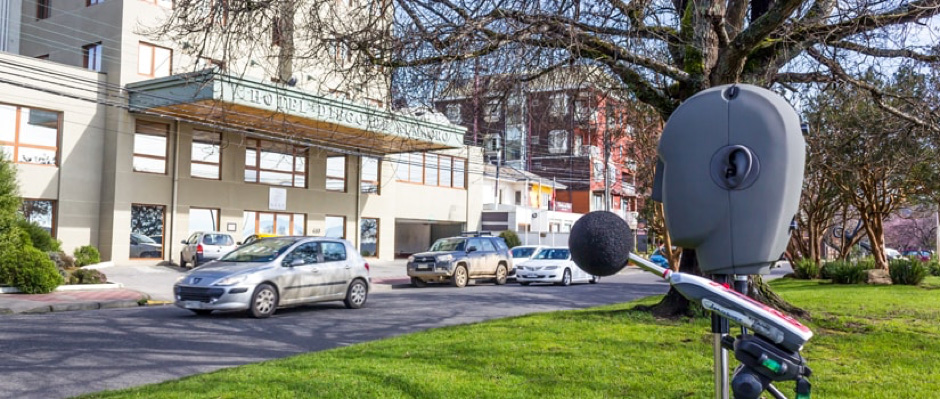
|
We would like to invite contributions of ideas for an EPSRC “Network Plus” on Noise, and Expressions of Interest in attending a scoping workshop in late April.
|
Deadline: Monday 8 April 2024 (12:00 noon)
|
|
Mark Plumbley, Abigail Bristow, Simone Graetzer, Alan Hunter, Antonio Torija Martinez
|
|
On behalf of UKAN+ bid team
|
|
|
|
|
|
ACOUSTICS 2024 12 - 13 September 2024
Business School, Manchester Metropolitan University
|
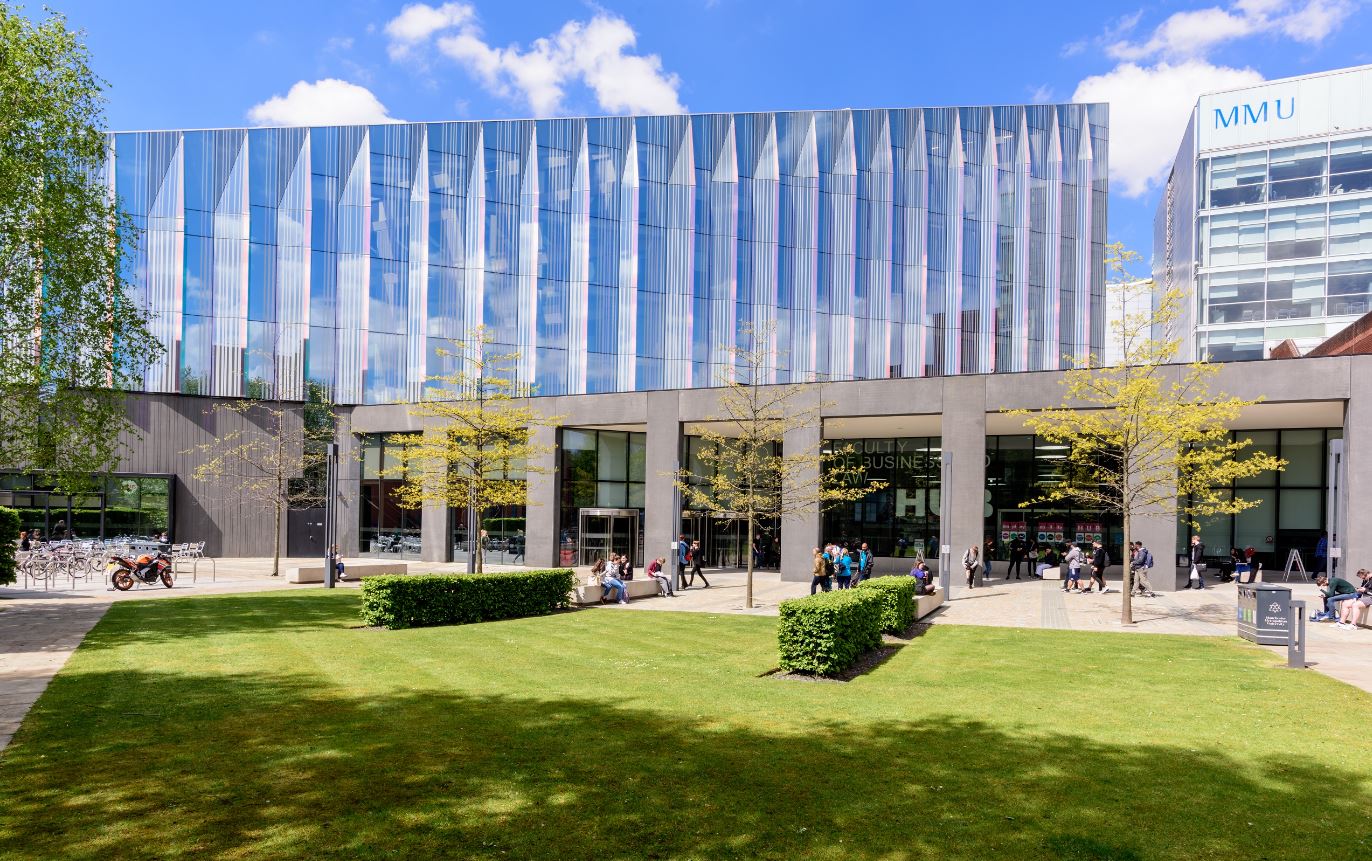
|
This conference will be held over two days, with the sessions below organised by the Specialist Groups.
|
You are encouraged to submit an abstract up to 250 words on any of the following or related topics, please indicate which group session it is intended for and whether you prefer oral or poster presentation.
|
- Buildings Acoustics Sound insulation, design, measurement, sound transmission in buildings
- Environmental Sound Noise assessment, soundscape and ventilation design
- Measurement and Instrumentation Sound and vibration measurements and analyses
- Musical Acoustics Musical instruments, spaces and people
- Noise and Vibration Engineering Industrial, environmental, occupational noise and vibration
- Physical Acoustics Sound Propagation and scattering, Acoustic materials
- Sound, Noise and Health Human health (non-auditory) effects associated with noise exposure and soundscapes
- Speech and Hearing Communication, human response to noise and vibration
- Early Careers & Senior Members Group Planning, policy, guidance, standards and strategy
Please include title, author(s) and affiliations(s) and submit your abstract by email to linda.canty@ioa.org.uk by Monday 29 April 2024. Authors will be notified of acceptance in May 2024.
|
|
Full papers will be required by Monday 19 August 2024. All oral and poster presenters will be invited to submit a paper for the proceedings. Exhibition space will be available.
|
|
|
|
The UK Acoustics YouTube account is upto to 500 subscribers
|

|
|
Subscribe to the UKAN YouTube channel you'll receive notifications when new videos are uploaded, making it easier for you to stay up-to-date with the latest content.
|
|
|
|
|
|

|
RefMap will create a digital service that optimises flight trajectories on both micro and macro levels. By using environmental data, such as wind, noise, CO2 and non-CO2 emissions, RefMap's analytics platform will help airlines and Unmanned Aerial Systems make more eco-friendly decisions.
|
The Acoustics Research Centre (ARC) at the University of Salford is working on development of:
|
- Psychoacoustic models to improve the assessment and perceptual modelling of drone noise: The focus will be on investigating the interdependencies between drone noise noticeability and annoyance for a number of different drone types, operating conditions and ambient background noise levels. Moreover, building upon a method developed by Torija et al. 2020, Virtual Reality and spatial audio techniques will be implemented to simulate highly immersive scenarios of drone operations in urban environments. This will be used to unravel the complex audio-visual interactions in drone noise perception. The focus will be to define targets for public acceptance of drone noise.
- A drone noise impact assessment framework for avian species: Through co-creation with end-users (facilitated by DronePrep), a noise impact assessment framework for wildlife will be developed. The drone noise models developed by the University of Salford and TU Delft (in the Netherlands) will enable prediction of the noise exposure of wildlife. A systematic review of noise effects on wildlife, coupled with targeted field experiments on responses to drone noise, will enable exposure assessment to be translated into impact assessment. The initial focus will be on birds (for this proof of concept), but the framework developed is expandable to other wildlife groups.
The outcomes of this work will contribute to development of a system for the trajectory optimisation of drone operations to minimise noise impacts on exposed communities and wildlife.
|
|
|
|
Dr Elaine Massung (Academic Smartcuts) and Professor Dan Allwood (Peak Writing) continue busting common proposal myths.
|
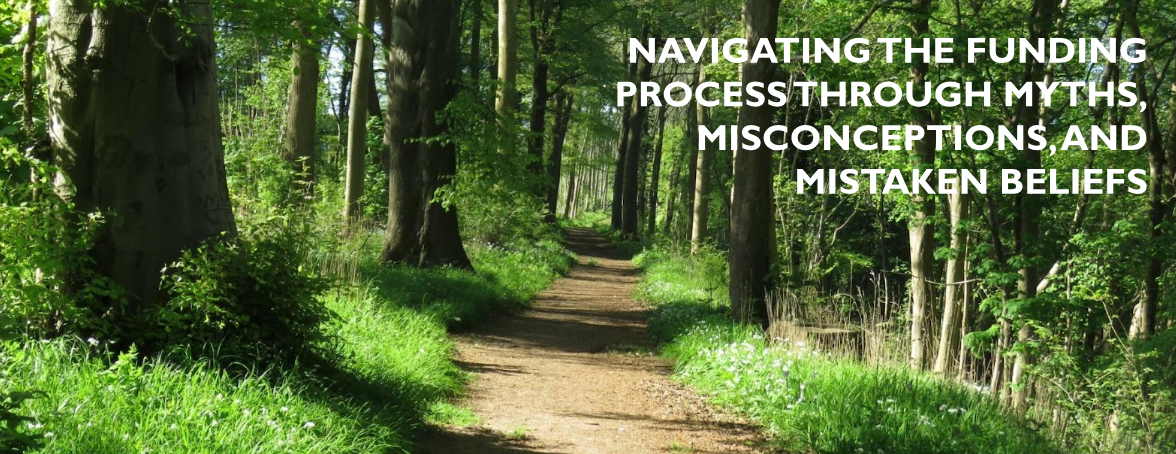
|
Reading about this myth is going to solve climate change, eliminate poverty, and cure cancer. It will save the government trillions of pounds and help every man, woman, child, and dog in the country. It will revolutionise every area of research it touches and be considered better than sliced bread and the invention of the wheel combined.
|
|
Don’t believe us? Then don’t include such statements in your own proposals.
|
|
MYTH #9: Grand proclamations are a great way to get your research noticed.
|
There is absolutely nothing wrong with highlighting the potential of your research. Indeed, being clear about the need your research will fill and the difference it will make in the world is an absolutely vital part of every proposal you write. However, the need and difference have to be genuine, and they should focus on what your specific project is going to accomplish.
|
For example, a project that helps reduce carbon emissions can state this in the proposal. It can describe how the work will contribute to the nation’s Net Zero strategy. It can even indicate the approximate amount of the carbon reduction, if this is a key outcome from the project. However, claiming that it will solve climate change is unlikely, casting doubt on everything else in the proposal.
|
The use of hyperbole is surprisingly common in grant proposals, but it should be avoided because it reduces the author’s credibility with the reviewer. Being confident about your research is fine, but this should be supported by evidence of its feasibility.
|
In addition, generic statements that could apply to any project should be avoided. Focus on your specific project: what exactly does it hope to achieve? How is it going to do this?
|
-
|
The research discussed in this proposal will benefit the UK economy. [How is it going to do this compared to another proposal?]
|
-
|
This research area will impact health and wellbeing. [Your specific project is not the same as your general research area.]
|
-
|
This project is novel. This project is timely. This project is a step change. [You can’t just tell a reviewer how you want your proposal to be perceived; you must show them how it fits these categories.]
|
|
Hyperbole can be colourful and generic statements are easy to write, but competitive proposals are about sharing your research vision with the reviewer. It should be compelling, precise, and, above all, realistic.
|
|
|
|
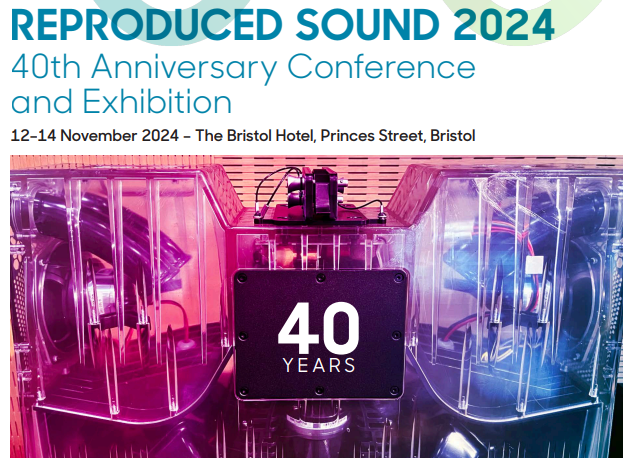
|
The 40th Reproduced Sound Conference will focus on all aspects of electroacoustics,
and will bring together practitioners, educators and students in an atmosphere with
a friendly and enthusiastic ‘buzz’, which is a hallmark of past RS conferences.
|
Call for Papers:
The committee invites papers and posters on all electroacoustic topics including the following:
• Loudspeakers and Microphones
• Speech Intelligibility
• Reproduction systems for electronic music
• Psychoacoustics
• Acoustics in Rooms
• Audio System Design
|
• Audio Signal Processing – Artificial Intelligence
• Installation Sound & Case Studies
• Immersive Audio
• Measurement, Modelling and Evaluation
• Cinema and Broadcast Sound
Please send your abstract (150 words) for papers plus a short biography of up to 150 words to linda.canty@ioa.org.uk by Friday 10 May 2024. Final written papers for the Proceedings must be submitted by Friday 25 October 2024.
|
|
|
|

|
|
|
|
|
|
|
|
|
Interdisciplinary Perspectives on Soundscapes and Wellbeing workshop
|
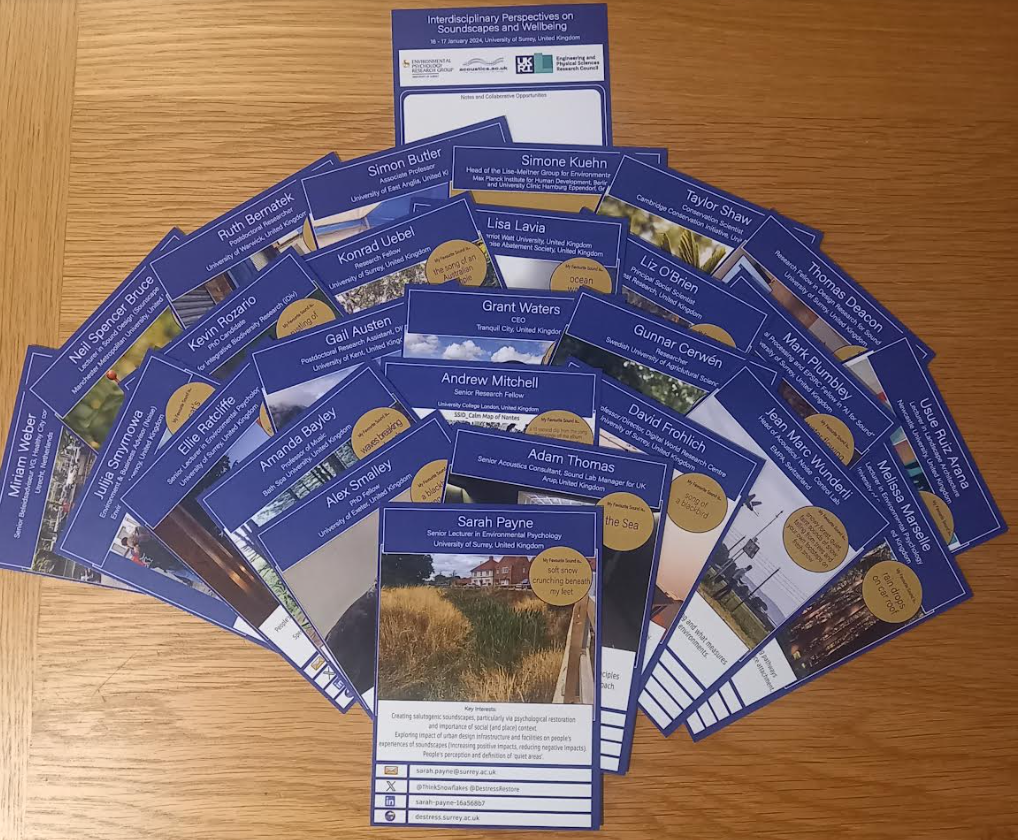
|
In January, the University of Surrey's Environmental Psychology Research Group hosted a hybrid workshop on “Interdisciplinary Perspectives on Soundscapes and Wellbeing”. The two-day event brought together 20 leading researchers and experts from the UK, who each gave a flash presentation on one of the following themes; Societal Engagement with Soundscapes; Soundscape Modelling & Use of AI; Nature Soundscapes & Biodiversity. These were interspersed with four European keynote speakers, who further discussed soundscapes and wellbeing from multiple perspectives.
|
|
· Dr Miriam Weber, WHO European Healthy Cities Network Coordinator for Utrecht, Netherlands discussed how to incorporate positive soundscapes into city planning. The holistic approach, included careful building façade design and orientation, acoustic masking, enhancing nature, and facilitating active travel.
|
|
· Dr Jean Marc Wunderli, Head of the Acoustics Noise Control Laboratory at Empa, presented several projects exploring the multisensory role of urban forest and urban green spaces on psychological restoration, annoyance, and environmental assessments.
|
|
· Professor Simone Kühn, Head of the Lise-Meitner Group for Environmental Neuroscience at the Max Planck Institute for Human Development, showcased her innovative work on identifying what happens in the brain when listening to noise pollution and positive soundscapes of nature.
|
|
· Dr Taylor Shaw, Conservation Scientist at the Cambridge Conservation Initiative, UK, brought an ecological perspective to soundscapes. She discussed the potential benefits of diverse forest ecosystem soundscapes on human health and wellbeing.
|
The workshop provided a unique platform for interdisciplinary dialogue, fostering discussions at the intersection of psychology, acoustics, ecology, and public health.
|
"We were overwhelmed by the level of interest in this workshop online (145 attendees) and were honoured to host such a great array of speakers representing the leading thinkers in soundscapes and wellbeing research and practice" remarked Dr Sarah Payne, Senior Lecturer at the University of Surrey. “The diverse perspectives, interests and expertise shared by participants underscore the importance of interdisciplinary collaboration in addressing contemporary environmental and health challenges.” Day two for the in-person attendees involved a ‘world café’ and sandpit sessions to identify research gaps, priorities, funding and implementation opportunities and discussing mechanisms for networking and building collaborations.
|
|
|
|
Connecting SIGs event on AI: scope and challenges of AI in Acoustics
|
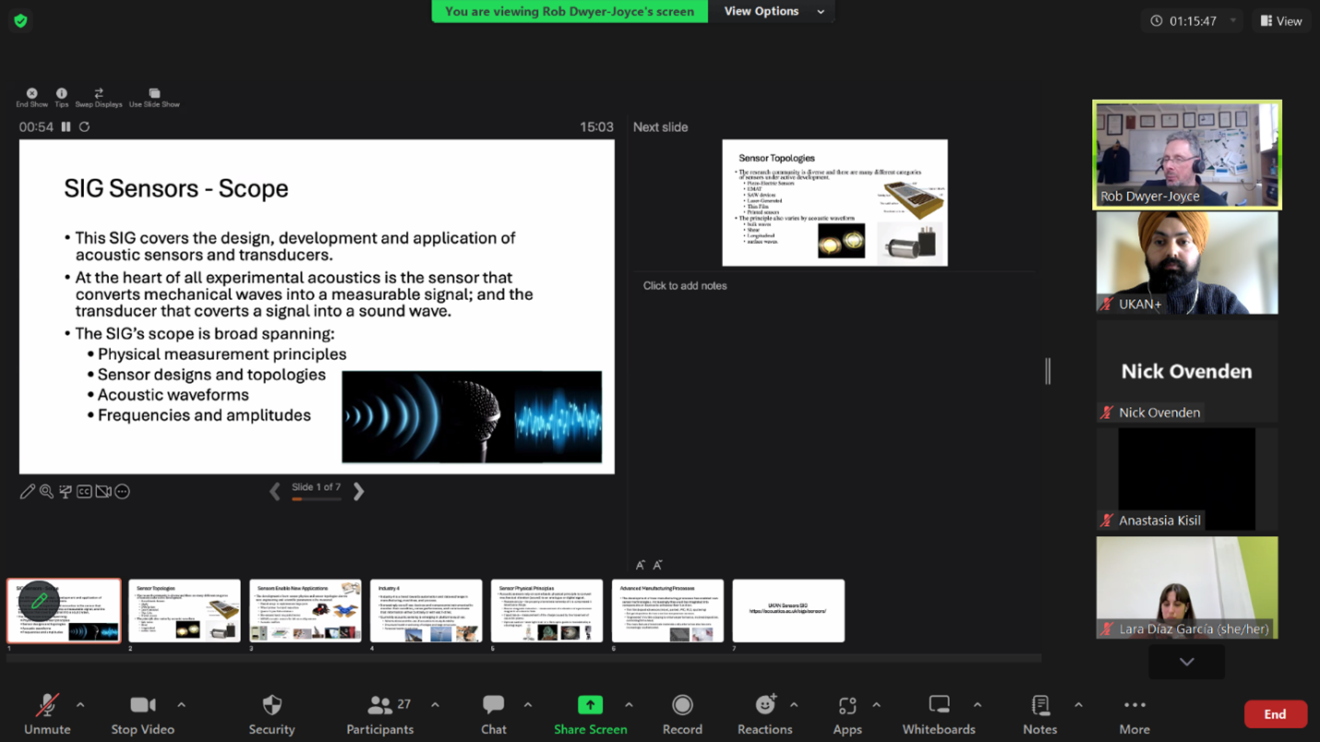
|
Summarized and led by Arshdeep Singh
|
A UKAN+ Connecting SIGs event on AI with the theme scope and challenges of AI in Acoustics was organized on 6 March 2024 in an online mode via Zoom. The organizers of the event include Arshdeep Singh (Surrey, Early career Acoustic champion for AI), Mark Plumbly & Alan Hunter (Acoustic champion of AI), Lara Diaz Garcia (Strathclyde, Bioacoustics SIG), Anastasia Kisil (Manchester, Mathematical Analysis in Acoustics SIG), Helen Whitehead (Salford, Bioacoustics SIG), Nick Ovenden (UCL, Computational Acoustics SIG), Rob Dwyer-Joyce (Sheffield, Sensors SIG), Simone Graetzer (Salford, Early Career SIG Chair). Thanks to Zoe Hunter for helping Arshdeep to understand more about the Zoom meeting interface.
|
|
Initial Event Planning & Program Schedule: The event was led by Arshdeep. Initial event planning included discussions with Simone, Alan and Mark to finalize the program schedule for the event. Alan and Mark suggested segregating the event into two themes to clarify the event's purpose better. The suggestion includes weighing both AI and connecting SIG events equally and independently. Therefore, Arshdeep planned to have the event program that first include SIG representative talks and then have short pitch talks and an invited talk on AI and acoustics themes. In the end, there was a discussion session involving all SIGs/participant to share their thoughts on the scope and challenges of AI in Acoustics in their respective research fields. By doing this, the event could successfully incorporate a broader range of SIG members interested in AI in addition to the 4 core SIGs represented in the event. The agenda/schedule of the event is given below,
|
|
Table 1: Connecting SIGs event on AI program Schedule
|
|
|
|
|
|
|
|
|
|
|
|
|
|
|
|
|
|
|
Short pitch talks(1-4)* + SIG rep talk (d)
|
|
|
|
|
|
|
|
|
|
|
|
Discussion/Closing remarks
|
|
|
|
|
Welcome address/host: Arshdeep Singh (Surrey)
|
|
b - Anastasia (Mathematical analysis in Acoustics SIG, Manchester)
|
|
c - Nicholas Ovenden (Computational Acoustics, UCL)
|
|
d - Rob Dwyer-Joyce (Sensors SIG, Sheffield)
|
|
Invited talk - Haohe Liu (Surrey) on "Recent Progress and Applications of Audio Artificial Intelligence Technologies"
|
*Short pitch talks: 4 participants from Singapore univeristy of Technology and design (SUTD), Peking University, Beijing, China, University of Manchester & University of Bristol.
|
During the event: The event had a total of 25-30 online participants from academia, industry (acoustic consultant), PhD students (1st, 3rd year) and from different countries UK, India, China, Singapore).
|
As mentioned in Table 1, the event started with a welcoming address from the host, Arshdeep. It includes an introduction to the event and the program schedule. Then, there were SIG representative talks and short pitch talks. The SIG representative talks (each 5-15mins) are delivered by Lara Diaz Garcia (Bio acoustics SIG, Strathclyde), Anastasia (Mathematical analysis in Acoustics SIG, Manchester) and Nicholas Ovenden (Computational Acoustics, UCL) and Rob Dwyer-Joyce (Sensors SIG, Sheffield). The SIG representatives shared the background of each SIG with previous activities and upcoming events.
|
The short pitch talk session includes 4 presentations, 5 minutes each. First participant presented a topic on "Predicting vocal tract geometry trained from acoustics impedance of elliptical cylinders". Second participant presented "Mathematics-informed neural network for Wiener-Hopf matrix kernel matrix factorization". Third participant discussed "Diffraction by a set of collinear cracks on a square lattice: an iterative Wiener-Hopf method approach". The last participant presented his research on "Bioacoustics and AI as a tool for detecting grey squirrel invasions".
|
Next, there was an invited lecture session. Haohe Liu, PhD student from the University of Surrey, presented his research on "Recent Progress and Applications of Audio Artificial Intelligence". Haohe's talk covers three aspects of AI and acoustics: (1) audio generation, (2) audio quality enhancement and (3) AI sound search. Haohe showed real-time demonstrations of the three aspects, making the talk attractive.
|
The last session includes open discussions on opportunities for AI within the participant's research area related to acoustics and AI challenges/limitations. Opportunities-wise, the participants discussed the use of AI in mathematical analysis, underwater acoustics to enhance data quality, and healthcare applications like dementia & lung conditions to use AI for data quality improvement. Challenges/limitations of AI include black box AI, especially in mathematical analysis, data sensitivity issues while recording/processing, availability of AI tools ensuring reproducibility and training required to train the researcher to use AI tools effectively with some domain knowledge. Other issues include only performance-based metric reporting while showcasing the AI research benefits. The discussion ends with the summary that it is equally essential to consider AI model size, AI limitations and domain knowledge to unbox the black box AI in addition to reporting/focusing only on state-of-the-art performance by AI.
|
|
|
|
The Art of Being an Acoustician
|
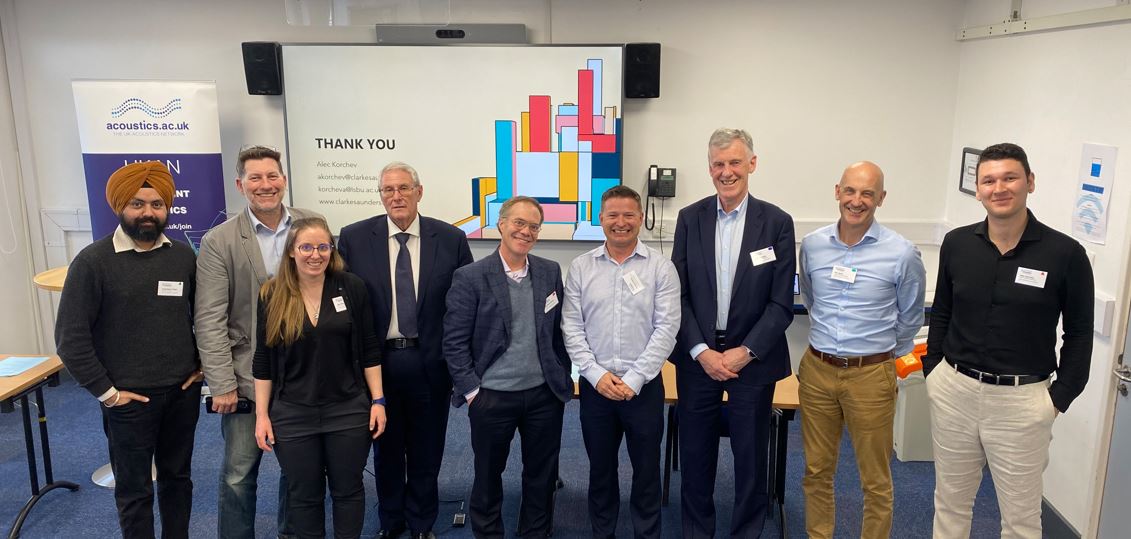
|
|
The 2nd Joint Art of Being event was held at the National Oceanographic Centre on 21/22nd March 2024. A diverse group of presenters representing early careers, seasoned acousticians, and senior members shared their experience with attendees (26% female, 23 in total). Early career were fully represented with the chairs of UKAN, ANC and IOA all presenting. Many thanks go to from Left to Right: Arshdeep Singh, Pete Rogers, Josie Nixon, Ken Marriott, Brad Backus, Stephen Dance, Phil Nelson, Ed Clarke and Alec Korchev, see photo.
|
|
|
|
|
If you have any news for our May newsletter do drop us an email before the 29th April 2024. We are interested to hear a range of news, perhaps you have a recent publication, or you would like to offer a blog for our community or maybe you know of some industry news we could share.
|
|
|
|
|